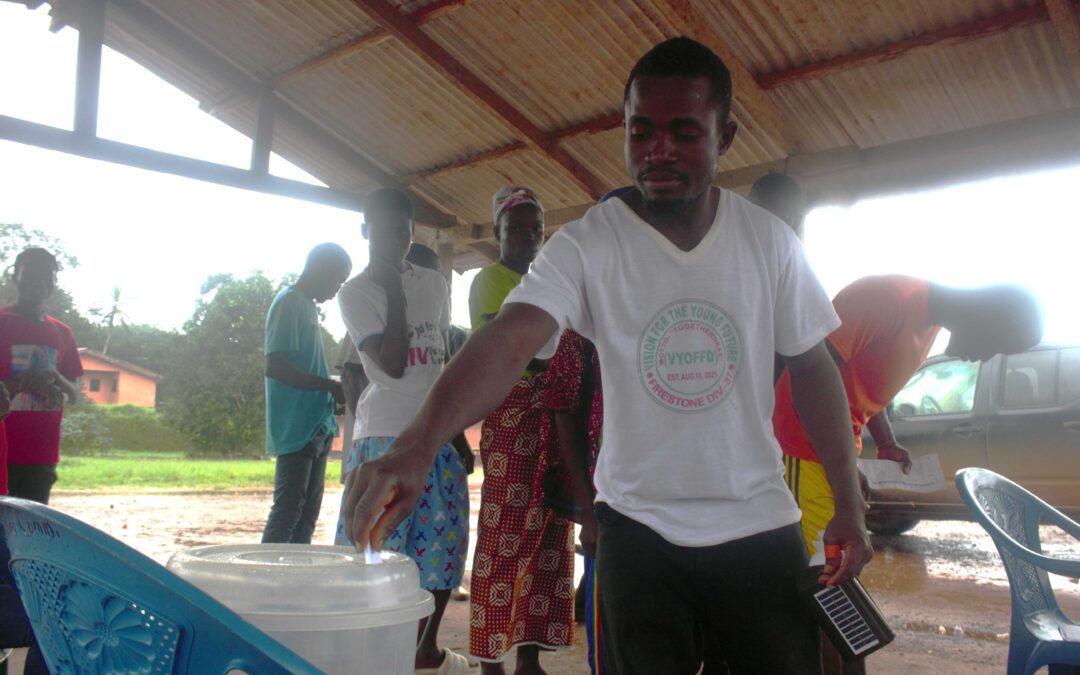In a significant win for equity on Firestone Liberia’s rubber plantation in Harbel, more than 90 percent of contract workers voted Saturday to join the Firestone Agricultural Workers’ Union of Liberia (FAWUL). With 1,660 votes for FAWUL representation, contract workers won the right to negotiate collectively with the employer for, they hope, the same wages and benefits currently enjoyed by directly employed workers who are already represented by FAWUL.
“We owe it to generation after generation of workers who have suffered to secure good jobs and dignity for ALL,” says FAWUL Chairperson Rodennick Bongorlee.
FAWUL’s organizing success is the result of the union’s long-term campaign for equity for Firestone’s contracted workers, whose precarious jobs and low wages, often for the same work as permanent employees, are in stark contrast to hard-won worker rights on the rubber plantation.
A 2008 collective bargaining agreement (CBA) and subsequent agreements were key for workers and labor rights in Liberia, where Firestone is the country’s largest employer. Previous to these agreements, plantation workers had endured working conditions that a 2005 human rights lawsuit against the company described as,”forced labor, the modern equivalent of slavery,” where exploitative quotas resulted in excessive hard labor and children working alongside their parents in lieu of attending school. However, through a series of agreements with the company since 2008, FAWUL won for directly employed workers improved conditions that include reduced quotas, better working conditions and compensation, on-site free schooling for workers’ children, a free onsite health clinic and somewhat improved housing.
But, after 15 years of partnership with agricultural workers on the plantation, the company is increasingly backtracking. By FAWUL’s calculations, since 2019, some 3,500 full-time jobs have been lost to Firestone-imposed transfers to contract positions, lay-offs and forced retirements. In 2019, Firestone fired up to 2,000 employees and required them to sign contracts with “labor contractors,” who in turn hired the former employees to perform the same work under Firestone Liberia’s supervision, but at significantly lower rates of pay, with no benefits and without the protections provided by FAWUL’s CBA.
Without collective voice and effective representation through a union, contract workers have been subject to safety risks and exploitation. Although all plantation workers face grave dangers to their health and safety, low-wage contract workers cannot afford personal protective equipment such as boots, gloves and glasses and are at increased risk related to acid use and snake bite exposure. And inadequate company housing for contract workers—usually a small, two-room brick apartment that houses 15–20 people from two extended families—is exposing contract workers and their families to unsafe crowding and, some workers report, rat infestation.
And, without CBA protection, contracted workers complain of economic exploitation. Contract tappers last month were describing Firestone Liberia’s measurement process for reimbursing latex extraction as “cheating,” and said they are being forced to work excessive overtime regularly without commensurate pay or, sometimes, any pay at all. Contract cup washers, most of whom are women who walk more than an hour to work, say they too are forced to work excessive hours without fair or, sometimes, any compensation. Excessive hours are enforced by threat of discipline or dismissal contract workers told the Solidarity Center—a very serious threat for those trapped in debt bondage to the company.
“We applaud the courage and spirit of the Firestone plantation workers who have steadfastly fought for a union to improve their lives and working conditions,” says Solidarity Center Executive Director Shawna Bader-Blau.
FAWUL in 2007 was awarded the AFL-CIO’s annual George Meany-Lane Kirkland Human Rights Award in recognition of the union’s “extraordinary courage” in successfully organizing more than 4,000 Firestone Liberia workers for the first time in the company’s 82-year existence in the country. An indirect subsidiary of Bridgestone Americas Inc., Firestone Liberia is the largest contiguous natural-rubber producing operation in the world. The company supplies Bridgestone with raw and block latex with which to manufacture tires in the United States. Approximately 25,000 people reside on the Firestone-Liberia plantation, including roughly 8,500 workers with their families. Because Firestone Liberia is an employment-standards trendsetter, plantation wages and working conditions have a direct impact on the livelihoods, rights and dignity of all workers in Liberia.
The Solidarity Center, in partnership with the United Steelworkers (USW), works with Liberian unions in key extractive industries such as mining, timber and rubber, as well as with domestic workers, to support them as they better serve their members and assist workers in forming unions.

